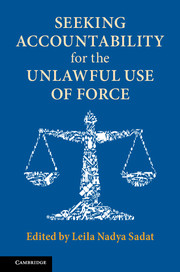Book contents
- Frontmatter
- Dedication
- Contents
- Notes on Contributors
- Foreword
- Preface
- Table of Cases
- Introduction
- PART I HISTORIC AND CONTEMPORARY PERSPECTIVES ON THE UNLAWFUL USE OF FORCE
- PART II MECHANISMS FOR RESTRAINING THE UNLAWFUL USE OF FORCE AND ENHANCING ACCOUNTABILITY
- PART III THE ILLEGAL USE OF FORCE AND THE PROSECUTION OF INTERNATIONAL CRIMES
- PART IV IMAGINING A BETTER WORLD
- Epilogue
- Index
8 - The International Court of Justice and the Use of Force
from Part II - Mechanisms for Restraining the Unlawful Use of Force and Enhancing Accountability
Published online by Cambridge University Press: 21 May 2018
- Frontmatter
- Dedication
- Contents
- Notes on Contributors
- Foreword
- Preface
- Table of Cases
- Introduction
- PART I HISTORIC AND CONTEMPORARY PERSPECTIVES ON THE UNLAWFUL USE OF FORCE
- PART II MECHANISMS FOR RESTRAINING THE UNLAWFUL USE OF FORCE AND ENHANCING ACCOUNTABILITY
- PART III THE ILLEGAL USE OF FORCE AND THE PROSECUTION OF INTERNATIONAL CRIMES
- PART IV IMAGINING A BETTER WORLD
- Epilogue
- Index
Summary
- Type
- Chapter
- Information
- Seeking Accountability for the Unlawful Use of Force , pp. 194 - 218Publisher: Cambridge University PressPrint publication year: 2018



